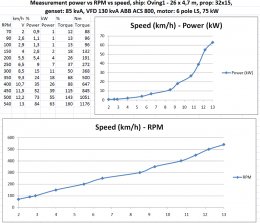DBA Forum (B) - Daniel Boekel
2014-09-29 22:09:02 UTC
I did some measurements last weekend, here are the results:
Loading Image...
LWL 24m x 4,7 x 1,2
60-70 tons?
prop: 32x15 (but that doesn't fit the measured numbers, pitch must be bigger)
rpm = prop rpm, electric motor directly on propshaft
average fuel consumption about 10 ltr/hr - but that is running 3/4 throttle and towing a lot of other boats...
2014-09-09 12:10 GMT+02:00 DBA Forum (B) - Colin Stone <dbabarges-pvYRptiajiAdnm+***@public.gmane.org>:
Intrigued by Charles Fitzhardinge's comment on Sp vs Engine Revs - erpm - in a recent post, (8+kph/1200erpm) I thought that a small survey would be of interest to see what the figures are for the same 8kph.
I guess LWL, Displacement, prop size and gearbox reduction are also important and overall fuel consumption.
So for KEI:
LWL 20m (BWL 4.85 Draft 1.1) 70 tons 30x20inch 4 blade reduction 2.5:1. 800erpm 8kph. Approx 1 kph/100erpm. Fuel 2.66ltr/hr this year.
Previous same size prop with much thicker blades was 2kph slower for same revs.
Any other stats? Will longer LWLs have higher speeds/erpm?
Colin Stone
KEI
Sent via BlackBerry® BIS
Loading Image...
LWL 24m x 4,7 x 1,2
60-70 tons?
prop: 32x15 (but that doesn't fit the measured numbers, pitch must be bigger)
rpm = prop rpm, electric motor directly on propshaft
average fuel consumption about 10 ltr/hr - but that is running 3/4 throttle and towing a lot of other boats...
2014-09-09 12:10 GMT+02:00 DBA Forum (B) - Colin Stone <dbabarges-pvYRptiajiAdnm+***@public.gmane.org>:
Intrigued by Charles Fitzhardinge's comment on Sp vs Engine Revs - erpm - in a recent post, (8+kph/1200erpm) I thought that a small survey would be of interest to see what the figures are for the same 8kph.
I guess LWL, Displacement, prop size and gearbox reduction are also important and overall fuel consumption.
So for KEI:
LWL 20m (BWL 4.85 Draft 1.1) 70 tons 30x20inch 4 blade reduction 2.5:1. 800erpm 8kph. Approx 1 kph/100erpm. Fuel 2.66ltr/hr this year.
Previous same size prop with much thicker blades was 2kph slower for same revs.
Any other stats? Will longer LWLs have higher speeds/erpm?
Colin Stone
KEI
Sent via BlackBerry® BIS
--
www.boekel.nu
www.boekel.nu